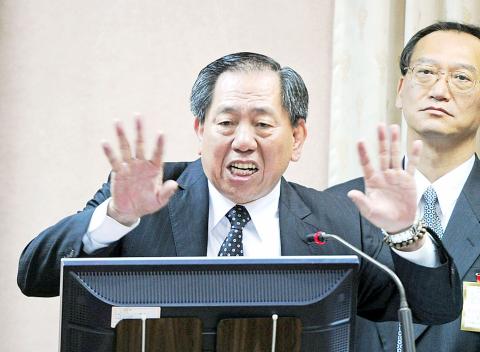National Security Bureau (NSB) Director Tsai Der-sheng (蔡得勝) yesterday said that his bureau does not support government agencies using China’s Huawei Technologies Co’s (華為) products and said the company should be barred from government bids.
Tsai made the remarks during a meeting of the legislature’s Foreign Affairs and National Defense Committee in the morning.
Democratic Progressive Party (DPP) Legislator Tsai Huang-liang (蔡煌瑯) asked Tsai Der-sheng whether government agencies, including the Presidential Office and the Ministry of Justice’s Investigation Bureau, had used Huawei’s network cards in their work cellphones.

Photo: CNA
He said that the government should be more alert to the possibility that confidential information could “very easily” be obtained by China via Huawei products.
Saying that Huawei is linked to the People’s Liberation Army, Tsai Huang-liang said that the government should ban the company from participating in public bids.
If the government itself is the biggest buyers of Huawei products, how could the government restrict private companies from buying Huawei products for national security concerns, he added.
“This is our policy now. The NSB has banned using Huawei’s products and thinks other government bureaus should not use the company’s products,” the NSB official added.
Tsai Huang-liang cited government statistics showing that the Investigation Bureau bought 124 sets of Huawei network cards, while the Presidential Office six sets and the Ministry of Transportation and Communications bought 20 Huawei cellphones.
The Mainland Affairs Council bought one set of Huawei’s network cards, but stopped using them after discovering they were produced by Huawei, he added.
The Investigation Bureau responded in a press statement that last year, it applied for a number of cellphone numbers from Chunghwa Telecom Co (中華電信) for agents’ internal communications, but Chunghwa offered network cards produced by Huawei with the numbers.
The Investigation Bureau added that those cellphones were closed-system cellphones used in inner network and could not be connected with the Internet or other networks.
The bureau is not concerned that confidential information could have been leaked by using those public phones, it added.
The Investigation Bureau said that it had no knowledge that the wireless network sticks it acquired from Chunghwa Telecom were manufactured by Huawei at the time of purchase.
“As the products have only been connected to the bureau’s closed internal network, there is no possibility that [confidential national security information] has been leaked,” the bureau said.
At a legislative session earlier yesterday, Tsai Huang-liang presented statistics regarding government agencies’ procurement of communication devices from Huawei in the past year.
The statistics showed that the Investigation Bureau had purchased 124 of Huawei’s E173 multi-mode wireless terminals, the largest number bought by any government agency.

Intelligence agents have recorded 510,000 instances of “controversial information” being spread online by the Chinese Communist Party (CCP) so far this year, the National Security Bureau (NSB) said in a report yesterday, as it warned of artificial intelligence (AI) being employed to generate destabilizing misinformation. The bureau submitted a written report to the Legislative Yuan in preparation for National Security Bureau Director-General Tsai Ming-yen’s (蔡明彥) appearance before the Foreign Affairs and National Defense Committee today. The CCP has been using cognitive warfare to divide Taiwanese society by commenting on controversial issues such as Taiwan Semiconductor Manufacturing Co’s (TSMC, 台積電) investments in the

INVESTIGATION: The case is the latest instance of a DPP figure being implicated in an espionage network accused of allegedly leaking information to Chinese intelligence Democratic Progressive Party (DPP) member Ho Jen-chieh (何仁傑) was detained and held incommunicado yesterday on suspicion of spying for China during his tenure as assistant to then-minister of foreign affairs Joseph Wu (吳釗燮). The Taipei District Prosecutors’ Office said Ho was implicated during its investigation into alleged spying activities by former Presidential Office consultant Wu Shang-yu (吳尚雨). Prosecutors said there is reason to believe Ho breached the National Security Act (國家安全法) by leaking classified Ministry of Foreign Affairs information to Chinese intelligence. Following interrogation, prosecutors petitioned the Taipei District Court to detain Ho, citing concerns over potential collusion or tampering of evidence. The

‘COMPREHENSIVE PLAN’: Lin Chia-lung said that the government was ready to talk about a variety of issues, including investment in and purchases from the US The National Stabilization Fund (NSF) yesterday announced that it would step in to staunch stock market losses for the ninth time in the nation’s history. An NSF board meeting, originally scheduled for Monday next week, was moved to yesterday after stocks plummeted in the wake of US President Donald Trump’s announcement of 32 percent tariffs on Taiwan on Wednesday last week. Board members voted to support the stock market with the NT$500 billion (US$15.15 billion) fund, with injections of funds to begin as soon as today. The NSF in 2000 injected NT$120 billion to stabilize stocks, the most ever. The lowest amount it

NEGOTIATIONS: Taiwan has good relations with Washington and the outlook for the negotiations looks promising, Minister of Economic Affairs J.W. Kuo said Taiwan’s GDP growth this year is expected to decrease by 0.43 to 1.61 percentage points due to the effects of US tariffs, National Development Council (NDC) Minister Paul Liu (劉鏡清) said at a meeting of the legislature’s Economics Committee in Taipei yesterday, citing a preliminary estimate by a private research institution. Taiwan’s economy would be significantly affected by the 32 percent “reciprocal” tariffs slapped by the US, which took effect yesterday, Liu said, adding that GDP growth could fall below 3 percent and potentially even dip below 2 percent to 1.53 percent this year. The council has commissioned another institution